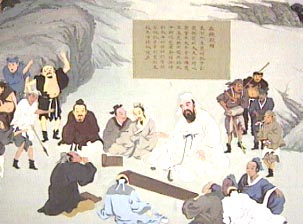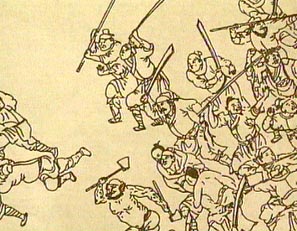 |
|
Outlaws of the Marsh  |
| CCTV.COM 2002-07-22 10:07:13 |
|
 Chinese classical literary masterpiece Outlaws of the Marsh has drawn material from a real peasant uprising in the 12th century, at the end of the Northern Song Dynasty. Peasant rebellion has been a characteristic of Chinese history. Like a scalpel or purifier, the peasant uprising can infuse new life into a society whose superstructure is deteriorating. A merit of Outlaws of the Marsh is that it praises a peasant uprising and vividly represents a grandiose social upheaval. Chinese classical literary masterpiece Outlaws of the Marsh has drawn material from a real peasant uprising in the 12th century, at the end of the Northern Song Dynasty. Peasant rebellion has been a characteristic of Chinese history. Like a scalpel or purifier, the peasant uprising can infuse new life into a society whose superstructure is deteriorating. A merit of Outlaws of the Marsh is that it praises a peasant uprising and vividly represents a grandiose social upheaval.
Outlaws of the Marsh begins with the villain Gao Qiu coming into power and gentlemen like Lin Chong driven to desperate situation. It was a society where justice was not upheld and honest people came to miserable end. Corruptive officials were in power and despots ran amuck. It is the tales of individual heroes who were driven to join the rebels that reveal the social roots and historical inevitability of peasant revolt.
 In ancient Chinese orthodox ideology, the rulers' legitimacy is based on morality. Therefore, resistance against unrighteous ruling is justifiable. Peasant uprisings would either become a means to a change of regime or surrender to the rulers. Considering that the peasant uprising is not a historical progress in a real sense, a peasant revolt must end with failure. In ancient Chinese orthodox ideology, the rulers' legitimacy is based on morality. Therefore, resistance against unrighteous ruling is justifiable. Peasant uprisings would either become a means to a change of regime or surrender to the rulers. Considering that the peasant uprising is not a historical progress in a real sense, a peasant revolt must end with failure.
In the latter part of Outlaws of the Marsh, Song Jiang and his men accepted the amnesty granted by the imperial court and then attacked the peasant insurrections led by Wang Hu and Fang La. Most heroes died in battlefields and Song Jiang too was persecuted by treacherous court officials. Thus a vigorous uprising ended in failure. Perhaps because of this conclusion, the latter part of Outlaws of the Marsh is obviously less attractive.
In traditional Chinese literature, in a prosperous time positive characters are all from emperors, ministers, generals, gifted scholars and beautiful ladies. In a degenerating time, however, good persons are in the commoners, like the gallant persons in Outlaws of the Marsh. The outlaws are loved not because of their super battle art, but because of their sense of justice and fraternity and their unflinching opposition to dark forces. This opposition to oppression is set into relief against the submissiveness of the general public. In contrast to the corruptive officials, avaricious merchants and hypocritical gentry, those simple and noble-minded greenwood heroes shed brilliant light of humanity.
The fraternity and gallantry of the heroes in Outlaws of the Marsh has profound influence on Chinese society. This, however, is seen only when social justice and law does not work. When the Zhou Dynasty was at a low ebb, seeing rites deteriorating in the court and among nobles, Confucius said, "When the rites are lost, they can be found in commoners." What one can find among the greenwood heroes is the true, the good and the beautiful that is common nature of human race but is lost in the upper classes.
|
|
|
|
|
|
|
 |









